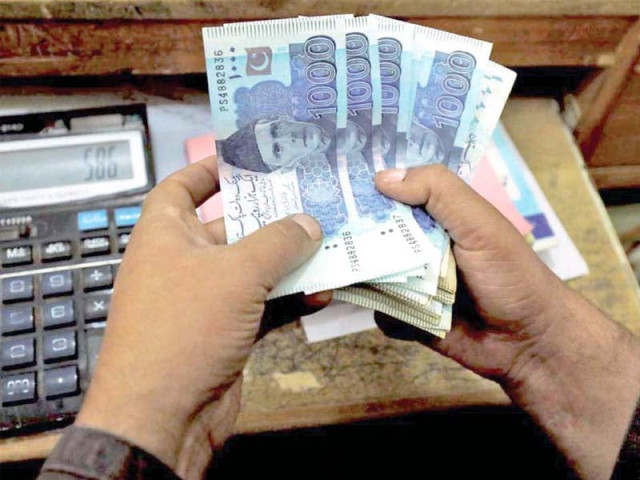Rupee drops to 157.51, gold shines
Currency depreciates in inter-bank market as IMF delays sixth review

Pakistan’s currency dropped to three-and-a-half-month low at Rs157.51 against the US dollar in the inter-bank market on Monday following the decision by the International Monetary Fund (IMF) to postpone sixth review of the country’s economy till September.
Besides, strengthening of the US dollar to multi-month highs against several other world currencies including the euro and pound supported the lacklustre gold market, which gained Rs1,550 to touch five-day high of Rs108,850 per tola (11.66 gram) in Pakistan in line with the global trend.
With a fresh drop of Rs0.62 on Monday, the rupee has cumulatively dropped Rs5.24 (or 3.44%) in the past one and a half month compared to the 23-month high close of Rs152.27 against the greenback on May 7, according to the central bank data.
Pakistan and the IMF have agreed to postpone the sixth economic review till September under the $6 billion loan programme as they failed to reach a staff-level agreement on measures to fix the economy in the recently held negotiations. “This will also delay the release of next IMF loan tranche for Pakistan (which has mounted pressure on the local currency),” Arif Habib Limited Head of Research Tahir Abbas said while talking to The Express Tribune.
Read more: Rupee strengthens against dollar
Besides, the World Bank and the Asian Development Bank (ADB) had also delayed their loans of $1 billion for Pakistan, he pointed out.
The depreciation of the rupee, however, looks to be a temporary phenomenon. A sharp increase in workers’ remittances from overseas Pakistanis, inflows under the Roshan Digital Accounts (RDAs) from the non-resident Pakistanis and revival of export earnings are expected to help the rupee regain some of the lost ground in the coming days and weeks.
Abbas forecast, “Pakistani currency will close somewhere around Rs155-156 against the US dollar at the end of current fiscal year on June 30, 2021.”
It might, however, depreciate to around Rs160 by December 31, 2021, he said.
Abbas said it was no more a controlled currency market and the rupee-dollar exchange rate was being determined by market forces keeping in view the demand and supply of foreign currencies.
“We hope workers’ remittances will remain strong-to-stable in the months to come. The inflows will support the rupee in regaining its value,” the analyst said.
However, over the next few days, the rupee may remain under pressure for different reasons including a rebound in international oil prices as the benchmark Brent crude touched a two-year high of around $73 per barrel.
Pakistan heavily relies on imported energy supplies to meet local demand, which has continuously been on the rise.
Abbas said Pakistan’s trade deficit had widened due to a continued surge in imports. The imports are set to rise further following the end of the current third wave of the Covid-19 pandemic in Pakistan.
This time, however, the surge in imports will not adversely impact the current account deficit in the next fiscal year starting July 1 due to higher remittances and a rebound in exports. The current account balance stood in surplus at around $750 million during the first 10 months (Jul-Apr) of the outgoing fiscal year.
Gold rebounds
“Strengthening of the US dollar in the international market has helped gold rebound worldwide. Accordingly, the precious metal gained in Pakistan as well,” All Sindh Saraf Jewellers Association (ASSJA) President Haji Haroon Chand said.
The US dollar gained in the wake of US central bank’s announcement to increase the interest rate later and stop injecting billions of dollars into its economy sooner than expected earlier, it was learnt.
Published in The Express Tribune, June 22nd, 2021.
Like Business on Facebook, follow @TribuneBiz on Twitter to stay informed and join in the conversation.











1724319076-0/Untitled-design-(5)1724319076-0-208x130.webp)






COMMENTS
Comments are moderated and generally will be posted if they are on-topic and not abusive.
For more information, please see our Comments FAQ